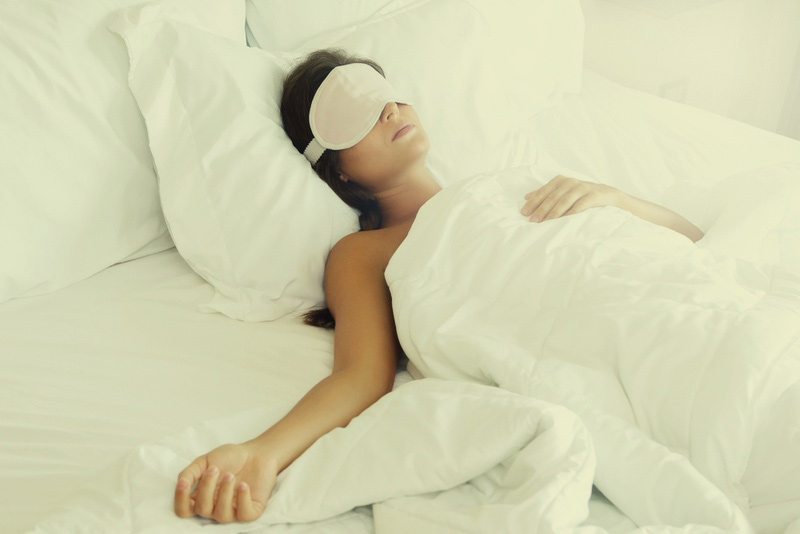Melatonin: What It Is, Benefits, and Natural Ways to Boost Levels

Melatonin is a word that many people are familiar with, but are often confused at what it has to do with sleep, exactly, and why it’s so important.
What is Melatonin?
Melatonin – commonly known as the sleep hormone – is a natural hormone produced by the pineal gland and bacteria in the gut that plays a role in various roles throughout the body including circadian rhythm, sleep, and immune health. (1)
Melatonin is involved in numerous aspects of the biological and physiological regulation of body functions. It helps promote total sleep time, aids with fatigue from jet lag, balances circadian rhythms, and help reset the body’s sleep/wake cycle. Melatonin has also been shown to modify immunity, the stress response, and certain aspects of the aging process.
Melatonin is largely responsible for regulating sleep cycles, helping to keep us awake at the right times (like during the day at work) and to fall asleep when we naturally should (when it is dark outside).
When you produce melatonin is just as important, if not more so, than the total amount that gets produced. Ideally, we want higher levels at night (beginning around 9pm) and lower levels in the morning. When the sun goes down and the day begins to get darker, the pineal gland is activated by the suprachiasmatic nucleus (SCN), and begins to produce melatonin, which is then released into the blood.
The SCN is essentially the body’s clock that helps to regulate activates that can affect the entire body, such as releasing stimulating hormones like cortisol, influencing how awake or tired we feel, and raising or lowering core body temperature.

As melatonin levels rise in the blood, we begin to feel sleepy and tired. Melatonin levels can stay elevated in the body for roughly 12 hours, and they should remain elevated through the entire night, as well as before light from the new bright and sunny day arrives. Melatonin levels should fall back to lower levels during the daytime by about 9am, and daytime levels should be barely detectable. When melatonin levels remain too high during the day, it can be difficult getting started in the morning and can lead to feelings of sluggishness or fatigue all day. (2,3)
Melatonin acts as a mediator between the thermoregulatory and arousal system in humans, as well as a modulator for immune health, as there is at least 400 times more melatonin in the gastrointestinal tract than in the pineal gland.
The gastrointestinal tract contributes significantly to circulating concentrations of melatonin, especially during the daytime. Melatonin acts as an endocrine hormone throughout the body, influencing the function and regeneration of the epithelium, as well as enhancing the immune system of the gut and overall body.
Melatonin also prevents the formation of ulcers on GI mucosa through its antioxidant action, and can reduce the secretion of excessive hydrochloric acid.
Due to melatonin’s unique properties, it has been used to treat cancer, GI issues such as IBS and ulcerative colitis, and even childhood colic. (4)
What Happens if We Have Low Melatonin?
Melatonin levels are directly influenced by a number of factors, and our lifestyle and sleep habits can be a big part of that. Factors that can lead to low melatonin include:
- Lack of sleep
- Rotating shift work (i.e. night shifts)
- Overstimulation of cortisol during the day from stress, inflammation, etc.
- Too much screen time (the infamous “blue light”)
- Lack of natural light exposure
- Time zone changes or frequent traveling
- Gut dysbiosis (bacterial imbalance)
- Natural aging
When melatonin levels become depleted, symptoms can include fatigue, sickness, agitation, depression, anxiety, and other mood disorders.
6 Health Benefits of Melatonin
Melatonin is clearly important, but what specifically can it do for your body when you have optimal levels?
1. Sleep Support
Roughly 70 million Americans suffer from a disorder of sleep and wakefulness that hinders their ability to function each day, but also jeopardizes health and longevity. Long term effects of sleep loss and sleep disorders can include: (5)
- Hypertension
- Diabetes
- Obesity
- Depression
- Heart attack
- Stroke
Melatonin helps with certain sleep disorders, such as jet lag, insomnia, and inability to fall asleep. It can shorten time to fall asleep, increase total sleep time, and even improve sleep quality and morning alertness. Melatonin has also been used successfully to treat serious sleep disorders in hyperactive and neurologically compromised children, such as those with ADHD. (6,7)
2. Jet Lag

Who doesn’t love to travel and adventure to new parts of the world? But all of the wanderlusting can leave melatonin levels shot. Jet lag is caused by travel across several times zones and can result in disrupted sleep, daytime fatigue, and just a general feeling of discomfort.
The American Academy of Sleep Medicine has found that using melatonin reduces jet lag symptoms and improves sleep after traveling across more than one time zone. When melatonin is taken close to the targeted bedtime at the destination, with doses between 0.5mg and 5mg, people fall asleep faster and have decreased jet-lag from flights, especially those crossing five or more time zones. The timing of melatonin is important though, because if taken too early in the day it can cause sleepiness. (8)
3. Immune Support
The antioxidant role of melatonin has been used for a variety of conditions in which oxidative stress is involved. The immune-enhancing effects of melatonin appear to be an integral immune-recovery mechanism with melatonin acting as a buffer against the harmful effects of stress on immune balance.
Immune modulating effects of melatonin can slow or prevent the inflammatory response in the body. Melatonin supplementation can also lead to increased expression of the antioxidants superoxide dismutase and glutathione peroxidase, two important enzymes for immune function. Melatonin has even been found to be more efficient than vitamin C in reducing the extent of oxidative stress, and can also reduce markers of oxidative stress more significantly than vitamin E or N-acetylcysteine against acetaminophen toxicity. (9)
4. Adrenal Support

A close relationship exists between the pineal gland in the brain and the pituitary/adrenal axis. Melatonin modulates the activity of this axis and the actions of steroid hormones that deal with the sympathetic nervous system.
Melatonin can also reduce overall stress hormone levels, and some research shows that it can even help improve depression. (10)
Chronically elevated levels of cortisol have been linked to several aspects of aging and age-associated problems like glucose intolerance, impaired immune function, and cancer. Melatonin can act as an anti-stress factor in the body, helping provide potential balance for all of these areas.
5. Cancer Support
Research has shown that melatonin can inhibit the incidence of chemically induced tumors, along with the growth and sometimes metastasis of cancers of the lung, liver, ovary, pituitary, and prostate, as well as melanoma and leukemia. It can also stabilize the disease and improve quality of life for about 40 percent of recipients, according to one study. (11)
Melatonin can also down-regulate estrogen receptors, inhibit estrogen stimulation, and slow breast cancer growth, suggesting that melatonin is a natural anti estrogen. (12)
6. Mood Support

The link between melatonin levels, pineal function, and mood disorders is seen in those who have both seasonal affective disorder (SAD) and classic “non seasonal” depressions. Research has found that nocturnal melatonin levels are low in those who suffer from major depressive disorder and panic disorder. This is seen most specifically in individuals who have abnormal pituitary-adrenal responses to excessive cortisol levels.
Suppressed melatonin secretion can also be associated with problems like nightmares, insomnia, dizziness, and depression. Brain serotonin levels have been shown to increase after melatonin supplementation, which is significant because serotonin has been linked with mood support, reduced anxiety, relieved insomnia, and improved impulse control. (13)
5 Natural Ways to Increase Melatonin
While some health benefits mentioned above clearly come from melatonin supplementation, there are also natural ways to boost your levels.
1. Make A Smoothie

While supplemental forms of melatonin can be taken to increase blood levels, you can simply work on your nutrition to get more melatonin into your diet. Widely found in both plant and animal sources, including human breast milk, melatonin can also be found in:
- Bananas
- Beets
- Cucumbers
- Pineapples
- Oranges
- Tomatoes
Forget sleepy time tea and opt for a pre-bedtime smoothie. Mix together half of a frozen banana, with half a cup of pineapple, half a cup of unsweetened almond milk, and a few handfuls of magnesium rich spinach (which can also help to relax the body) and enjoy this melatonin milkshake while you are unwinding from the day! (14)
2. Sleep in Complete Darkness

Whether you are on your cell phone, laptop, tablet, or watching TV, light from these devices disrupts your body’s natural circadian rhythm, causing your serotonin and melatonin production to decrease. Even the tiniest bit of light can disrupt your internal clock and your pineal gland’s production of two important sleep hormones, melatonin and serotonin.
Small amounts of light can pass directly through your optic nerve to your hypothalamus, which controls your biological clock. Any light, even from the dim glow of an alarm clock, can trick your brain into thinking it is still stay daytime and can tell your brain that it is time to wake up. The brain then begins secreting melatonin between 9 and 10pm, and any devices that emit short wavelength blue light, such as your smartphone or computer, can disrupt that process and prevent you from falling asleep.
Power off any light-producing devices about two hours before bedtime and ensure that your room is completely dark. (15)
3. Reserve Your Bed for ONLY Sleep

We are constantly bombarded and inundated with stimuli from all areas of our life, including technology, mental and emotional worries, and everyday work and life stressors. The last thing we want to bring into bed with us is the everyday annoyances that cause our minds to feel tense and anxious and prevent us from unwinding.
Although we think things like responding to lingering emails, scrolling through social media platforms, or watching TV might help us unwind, they actually make it more difficult to fall asleep and relax. Try your best to avoid doing these activities in your actual bedroom in an effort to keep your room’s environment serene and calming and to avoid over-stimulating the brain, which can prevent you from falling asleep quickly.
Try to get to sleep by 10 P.M. so that you give yourself enough time to settle down and ease off into a restful night of sleep. Cortisol, which is released in the presence of light, has a half-life of roughly 90 minutes, so even if you are in bed at 10 P.M. but watching your favorite show or scrolling through Instagram, at around 11:30 P.M. there will still be half the amount of cortisol present in your bloodstream, so power off early! (16)
4. Focus on Sleep Hygiene

When I say sleep hygiene I do not mean how fresh your sheets smell, but rather having a regular sleeping and waking schedule and routine. Creating a sleep ritual that includes a set of little things you do before bed that helps get you and your system ready for sleep can be very therapeutic. This could include trying to establish set sleeping and waking times, journaling your thoughts before sleep, having a cup of tea, meditating, deep breathing, or using essential oils and aromatherapy.
The idea is to find things that will help you feel relaxed that you can effortlessly do each night and that become as habitual as brushing your teeth before you go to bed. (17)
5. Stay Cool
It is tempting to want to keep your house warm during the cold winter months, but it is ideal to keep the temperature in your bedroom a bit cooler, no higher than 70 degrees Fahrenheit. The ideal range for sleeping falls on the cooler sides, somewhere between 60 to 68 degrees.
When you are sleeping, your body’s internal temperature drops and many researchers believe that having a cooler bedroom is more conducive for quality sleep as it mimics the body’s natural temperature drop. (18)
Bottom Line
Melatonin is a potent hormone that regulates sleep and numerous other essential areas of life. Lifestyle alone can disrupt healthy melatonin levels, but with a few key changes, you can start creating better sleep and hormone balance in your body without needing medications or supplements.

The post Melatonin: What It Is, Benefits, and Natural Ways to Boost Levels appeared first on PaleoPlan.
from PaleoPlan https://ift.tt/2xYce6s
Entry Published : June 09, 2018 at 08:13AM
EntryContent :

Melatonin is a word that many people are familiar with, but are often confused at what it has to do with sleep, exactly, and why it’s so important.
What is Melatonin?
Melatonin – commonly known as the sleep hormone – is a natural hormone produced by the pineal gland and bacteria in the gut that plays a role in various roles throughout the body including circadian rhythm, sleep, and immune health. (1)
Melatonin is involved in numerous aspects of the biological and physiological regulation of body functions. It helps promote total sleep time, aids with fatigue from jet lag, balances circadian rhythms, and help reset the body’s sleep/wake cycle. Melatonin has also been shown to modify immunity, the stress response, and certain aspects of the aging process.
Melatonin is largely responsible for regulating sleep cycles, helping to keep us awake at the right times (like during the day at work) and to fall asleep when we naturally should (when it is dark outside).
When you produce melatonin is just as important, if not more so, than the total amount that gets produced. Ideally, we want higher levels at night (beginning around 9pm) and lower levels in the morning. When the sun goes down and the day begins to get darker, the pineal gland is activated by the suprachiasmatic nucleus (SCN), and begins to produce melatonin, which is then released into the blood.
The SCN is essentially the body’s clock that helps to regulate activates that can affect the entire body, such as releasing stimulating hormones like cortisol, influencing how awake or tired we feel, and raising or lowering core body temperature.

As melatonin levels rise in the blood, we begin to feel sleepy and tired. Melatonin levels can stay elevated in the body for roughly 12 hours, and they should remain elevated through the entire night, as well as before light from the new bright and sunny day arrives. Melatonin levels should fall back to lower levels during the daytime by about 9am, and daytime levels should be barely detectable. When melatonin levels remain too high during the day, it can be difficult getting started in the morning and can lead to feelings of sluggishness or fatigue all day. (2,3)
Melatonin acts as a mediator between the thermoregulatory and arousal system in humans, as well as a modulator for immune health, as there is at least 400 times more melatonin in the gastrointestinal tract than in the pineal gland.
The gastrointestinal tract contributes significantly to circulating concentrations of melatonin, especially during the daytime. Melatonin acts as an endocrine hormone throughout the body, influencing the function and regeneration of the epithelium, as well as enhancing the immune system of the gut and overall body.
Melatonin also prevents the formation of ulcers on GI mucosa through its antioxidant action, and can reduce the secretion of excessive hydrochloric acid.
Due to melatonin’s unique properties, it has been used to treat cancer, GI issues such as IBS and ulcerative colitis, and even childhood colic. (4)
What Happens if We Have Low Melatonin?
Melatonin levels are directly influenced by a number of factors, and our lifestyle and sleep habits can be a big part of that. Factors that can lead to low melatonin include:
- Lack of sleep
- Rotating shift work (i.e. night shifts)
- Overstimulation of cortisol during the day from stress, inflammation, etc.
- Too much screen time (the infamous “blue light”)
- Lack of natural light exposure
- Time zone changes or frequent traveling
- Gut dysbiosis (bacterial imbalance)
- Natural aging
When melatonin levels become depleted, symptoms can include fatigue, sickness, agitation, depression, anxiety, and other mood disorders.
6 Health Benefits of Melatonin
Melatonin is clearly important, but what specifically can it do for your body when you have optimal levels?
1. Sleep Support
Roughly 70 million Americans suffer from a disorder of sleep and wakefulness that hinders their ability to function each day, but also jeopardizes health and longevity. Long term effects of sleep loss and sleep disorders can include: (5)
- Hypertension
- Diabetes
- Obesity
- Depression
- Heart attack
- Stroke
Melatonin helps with certain sleep disorders, such as jet lag, insomnia, and inability to fall asleep. It can shorten time to fall asleep, increase total sleep time, and even improve sleep quality and morning alertness. Melatonin has also been used successfully to treat serious sleep disorders in hyperactive and neurologically compromised children, such as those with ADHD. (6,7)
2. Jet Lag

Who doesn’t love to travel and adventure to new parts of the world? But all of the wanderlusting can leave melatonin levels shot. Jet lag is caused by travel across several times zones and can result in disrupted sleep, daytime fatigue, and just a general feeling of discomfort.
The American Academy of Sleep Medicine has found that using melatonin reduces jet lag symptoms and improves sleep after traveling across more than one time zone. When melatonin is taken close to the targeted bedtime at the destination, with doses between 0.5mg and 5mg, people fall asleep faster and have decreased jet-lag from flights, especially those crossing five or more time zones. The timing of melatonin is important though, because if taken too early in the day it can cause sleepiness. (8)
3. Immune Support
The antioxidant role of melatonin has been used for a variety of conditions in which oxidative stress is involved. The immune-enhancing effects of melatonin appear to be an integral immune-recovery mechanism with melatonin acting as a buffer against the harmful effects of stress on immune balance.
Immune modulating effects of melatonin can slow or prevent the inflammatory response in the body. Melatonin supplementation can also lead to increased expression of the antioxidants superoxide dismutase and glutathione peroxidase, two important enzymes for immune function. Melatonin has even been found to be more efficient than vitamin C in reducing the extent of oxidative stress, and can also reduce markers of oxidative stress more significantly than vitamin E or N-acetylcysteine against acetaminophen toxicity. (9)
4. Adrenal Support

A close relationship exists between the pineal gland in the brain and the pituitary/adrenal axis. Melatonin modulates the activity of this axis and the actions of steroid hormones that deal with the sympathetic nervous system.
Melatonin can also reduce overall stress hormone levels, and some research shows that it can even help improve depression. (10)
Chronically elevated levels of cortisol have been linked to several aspects of aging and age-associated problems like glucose intolerance, impaired immune function, and cancer. Melatonin can act as an anti-stress factor in the body, helping provide potential balance for all of these areas.
5. Cancer Support
Research has shown that melatonin can inhibit the incidence of chemically induced tumors, along with the growth and sometimes metastasis of cancers of the lung, liver, ovary, pituitary, and prostate, as well as melanoma and leukemia. It can also stabilize the disease and improve quality of life for about 40 percent of recipients, according to one study. (11)
Melatonin can also down-regulate estrogen receptors, inhibit estrogen stimulation, and slow breast cancer growth, suggesting that melatonin is a natural anti estrogen. (12)
6. Mood Support

The link between melatonin levels, pineal function, and mood disorders is seen in those who have both seasonal affective disorder (SAD) and classic “non seasonal” depressions. Research has found that nocturnal melatonin levels are low in those who suffer from major depressive disorder and panic disorder. This is seen most specifically in individuals who have abnormal pituitary-adrenal responses to excessive cortisol levels.
Suppressed melatonin secretion can also be associated with problems like nightmares, insomnia, dizziness, and depression. Brain serotonin levels have been shown to increase after melatonin supplementation, which is significant because serotonin has been linked with mood support, reduced anxiety, relieved insomnia, and improved impulse control. (13)
5 Natural Ways to Increase Melatonin
While some health benefits mentioned above clearly come from melatonin supplementation, there are also natural ways to boost your levels.
1. Make A Smoothie

While supplemental forms of melatonin can be taken to increase blood levels, you can simply work on your nutrition to get more melatonin into your diet. Widely found in both plant and animal sources, including human breast milk, melatonin can also be found in:
- Bananas
- Beets
- Cucumbers
- Pineapples
- Oranges
- Tomatoes
Forget sleepy time tea and opt for a pre-bedtime smoothie. Mix together half of a frozen banana, with half a cup of pineapple, half a cup of unsweetened almond milk, and a few handfuls of magnesium rich spinach (which can also help to relax the body) and enjoy this melatonin milkshake while you are unwinding from the day! (14)
2. Sleep in Complete Darkness

Whether you are on your cell phone, laptop, tablet, or watching TV, light from these devices disrupts your body’s natural circadian rhythm, causing your serotonin and melatonin production to decrease. Even the tiniest bit of light can disrupt your internal clock and your pineal gland’s production of two important sleep hormones, melatonin and serotonin.
Small amounts of light can pass directly through your optic nerve to your hypothalamus, which controls your biological clock. Any light, even from the dim glow of an alarm clock, can trick your brain into thinking it is still stay daytime and can tell your brain that it is time to wake up. The brain then begins secreting melatonin between 9 and 10pm, and any devices that emit short wavelength blue light, such as your smartphone or computer, can disrupt that process and prevent you from falling asleep.
Power off any light-producing devices about two hours before bedtime and ensure that your room is completely dark. (15)
3. Reserve Your Bed for ONLY Sleep

We are constantly bombarded and inundated with stimuli from all areas of our life, including technology, mental and emotional worries, and everyday work and life stressors. The last thing we want to bring into bed with us is the everyday annoyances that cause our minds to feel tense and anxious and prevent us from unwinding.
Although we think things like responding to lingering emails, scrolling through social media platforms, or watching TV might help us unwind, they actually make it more difficult to fall asleep and relax. Try your best to avoid doing these activities in your actual bedroom in an effort to keep your room’s environment serene and calming and to avoid over-stimulating the brain, which can prevent you from falling asleep quickly.
Try to get to sleep by 10 P.M. so that you give yourself enough time to settle down and ease off into a restful night of sleep. Cortisol, which is released in the presence of light, has a half-life of roughly 90 minutes, so even if you are in bed at 10 P.M. but watching your favorite show or scrolling through Instagram, at around 11:30 P.M. there will still be half the amount of cortisol present in your bloodstream, so power off early! (16)
4. Focus on Sleep Hygiene

When I say sleep hygiene I do not mean how fresh your sheets smell, but rather having a regular sleeping and waking schedule and routine. Creating a sleep ritual that includes a set of little things you do before bed that helps get you and your system ready for sleep can be very therapeutic. This could include trying to establish set sleeping and waking times, journaling your thoughts before sleep, having a cup of tea, meditating, deep breathing, or using essential oils and aromatherapy.
The idea is to find things that will help you feel relaxed that you can effortlessly do each night and that become as habitual as brushing your teeth before you go to bed. (17)
5. Stay Cool
It is tempting to want to keep your house warm during the cold winter months, but it is ideal to keep the temperature in your bedroom a bit cooler, no higher than 70 degrees Fahrenheit. The ideal range for sleeping falls on the cooler sides, somewhere between 60 to 68 degrees.
When you are sleeping, your body’s internal temperature drops and many researchers believe that having a cooler bedroom is more conducive for quality sleep as it mimics the body’s natural temperature drop. (18)
Bottom Line
Melatonin is a potent hormone that regulates sleep and numerous other essential areas of life. Lifestyle alone can disrupt healthy melatonin levels, but with a few key changes, you can start creating better sleep and hormone balance in your body without needing medications or supplements.

The post Melatonin: What It Is, Benefits, and Natural Ways to Boost Levels appeared first on PaleoPlan.
via IFTTT
No comments: